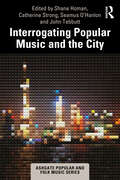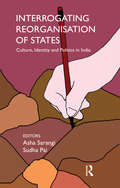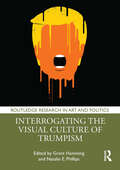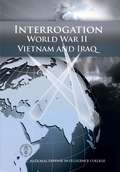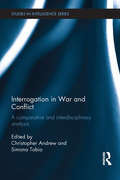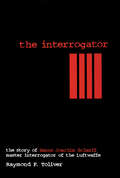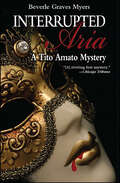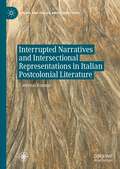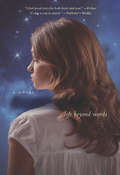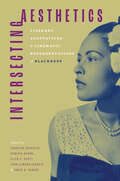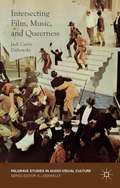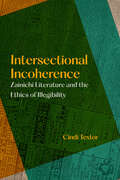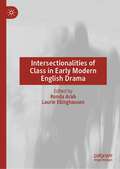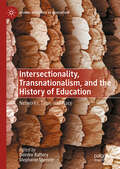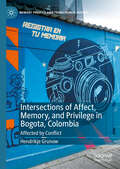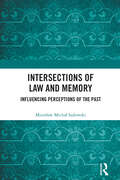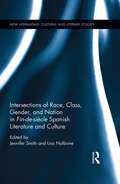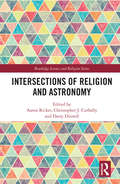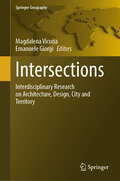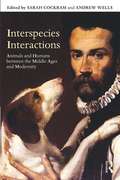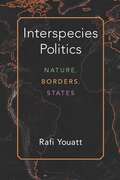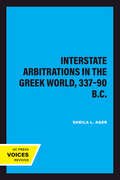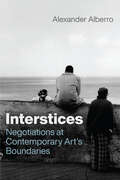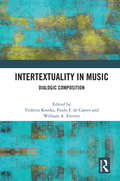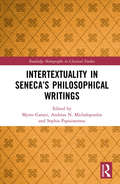- Table View
- List View
Interrogating Popular Music and the City (ISSN)
by Catherine Strong Shane Homan Seamus O'Hanlon John TebbuttHow does popular music influence the culture and reputation of a city, and what does a city do to popular music? Interrogating Popular Music and the City examines the ways in which urban environments and music cultures intersect in various locales around the globe. Music and cities have been partners in an often clumsy, sometimes accidental but always exciting dance. Heritage and immigration, noise and art, policy and politics are some of the topics that are addressed in this critical examination of relationships between cities and music. The book draws upon an international array of researchers, encompassing hip hop in Beijing; the city favelas of Brazil; from Melbourne bars to European parliaments; to heritage and tourism debates in Salzburg and Manchester. In doing so, it interrogates the different agendas of audiences, musicians and policy-makers in distinct urban settings.
Interrogating Reorganisation of States: Culture, Identity and Politics in India
by Asha SarangiThe volume analyses the complex historical and political context for the processes of state formation in independent India. It provides both a conceptual and empirical framework for an understanding of Indian democracy through the perspective of reorganisation of states.Following the recommendations of the States Reorganisation Commission (SRC) in 1956, the territorial boundaries of the states were redrawn. However, within a decade, the geo-linguistic and cultural-ideological criteria could not be considered satisfactory for the future division of states. With the formation of three new states (Chhattisgarh, Uttarakhand and Jharkhand) and the demand for Telangana statehood not accepted as yet, new dimensions and perspectives about state formation as a critical political practice have surfaced yet again in contemporary India. The book addresses a number of significant themes related to states reorganisation and its effects — questions of underdevelopment, size, political participation, governance, cultural identities — and also analyses the demand for smaller states. It focuses on different states, their historical and contemporary trajectory leading to the demand for territorial remapping and thus recognising specific political and cultural resources, and identities in the regions and sub-regions of states in India.The book will be useful for those studying politics, history, sociology, comparative politics and South Asian Studies.
Interrogating the Visual Culture of Trumpism (Routledge Research in Art and Politics)
by Grant Hamming Natalie E. PhillipsBringing together scholars from art history, visual studies, and related disciplines, this edited volume asks why Trumpism looks the way it does and what that look means for American—and global—society.Grouped into six categories, the essays in this volume tackle some of the most perplexing—and urgent—aspects of the Trumpist visual project. Two of the most striking aspects of that project are its use of novel commodity forms, including the iconic red baseball caps, as well as its embrace of social media. Trump’s outlandish persona and striking physicality have lent themselves to caricature both from his critics and, perhaps more surprisingly, his supporters. That physicality—as well as his movement’s hearkening back to a (mostly imagined) era of mid-twentieth-century prosperity—has also brought gender and the body into sharp focus. Perhaps second only to the aforementioned red hat is Trumpism’s vigorous use of interventions into public space, including traditional campaign signs as well as flags and other ad hoc visual and architectural materials. Finally, there were the events of January 6, 2021, when many of Trumpism’s most outré visual and cultural preoccupations exploded from the shadows onto television screens across the country. Taken as a whole, the essays in this book examine Trumpist visuality from the seemingly trivial to the starkly horrifying, as well as offering a measured sense of the various resistances and responses that have characterized artistic responses to Trump from the beginning of his prominence.The book will be of interest to scholars working in art history, visual culture, American studies, and cultural and media studies.
Interrogation World War II, Vietnam, And Iraq: World War Ii, Vietnam, And Iraq
by James A. Stone David P. Shoemaker Major Nicholas R. DottiIn September 2004, the Intelligence Science Board, an advisory board appointed by the Director of National Intelligence, initiated the Study on Educing Information (EI). This study is an ongoing effort to review what is known scientifically about interrogation and other forms of human intelligence collection and to chart a path to the future.As part of our efforts, we have worked closely with faculty and students of the National Defense Intelligence College. The NDIC Press published Educing Information: Interrogation: Science and Art, Foundations for the Future, a book based on Phase I of the Study on EI. Three students, Special Agent James Stone, U.S. Air Force; Special Agent David Shoemaker, U.S. Air Force; and Major Nicholas Dotti, U.S. Army, completed master's thesis studies during Academic Year 2006-07 on topics related to interrogation. Each thesis is a remarkable and useful document.Special Agent Stone researched U.S. efforts during World War II to develop language and interrogation capacities to deal with our Japanese enemy. He found that military leaders, often working with civilian counterparts, created and implemented successful strategies, building on cultural and linguistic skills that substantially aided the war effort for the U.S. and its Allies.Special Agent Shoemaker studied the experiences of three successful interrogators during the Vietnam War. Like S/A Stone, S/A Shoemaker suggests that policymakers and practitioners have much to learn from professionals who served effectively for years in the field educing information. And like Stone, Shoemaker highlights the importance of a deep understanding of the language, psychology, and culture of adversaries and potential allies in other countries.
Interrogation in War and Conflict: A Comparative and Interdisciplinary Analysis (Studies in Intelligence)
by Christopher Andrew Simona TobiaThis edited volume offers a comparative and interdisciplinary analysis of interrogation and questioning in war and conflict in the twentieth century. Despite the current public interest and its military importance, interrogation and questioning in conflict is still a largely under-researched theme. This volume’s methodological thrust is to select historical case studies ranging in time from the Great War to the conflicts in former Yugoslavia, and including the Second World War, decolonization, the Cold War, the ‘Troubles’ in Northern Ireland and international justice cases in The Hague, each of which raises interdisciplinary issues about the role of interrogation. These case-studies were selected because they resurface previously unexplored sources on the topic, or revisit known cases which allow us to analyse the role of interrogation and questioning in intelligence, security and military operations. Written by a group of experts from a range of disciplines including history, intelligence, psychology, law and human rights, Interrogation in War and Conflict provides a study of the main turning points in interrogation and questioning in twentieth-century conflicts, over a wide geographical area. The collection also looks at issues such as the extent of the use of harsh techniques, the value of interrogation to military intelligence, security and international justice, the development of interrogation as a separate profession in intelligence, as well as the relationship between interrogation and questioning and wider society. This book will be of much interest to students of intelligence studies, strategic studies, counter-terrorism, international justice, history and IR in general.
Interrogator: The Story of Hanns-Joachim Scharff, Master Interrogator of the Luftwaffe (Schiffer Military History History)
by Raymond F. ToliverThe story of Hanns Scharff, Nazi Germany&’s master interrogator who questioned American POWs with subtle, startlingly effective tactics. During World War II, German Intelligence Officer Hanns Scharff gained the reputation as the man who could magically get all the answers he needed from a prisoner of war. In most cases, the POWs being interrogated never realized that their words, small talk or otherwise, were important pieces of the mosaic Scharff was constructing. He was so effective that the USAF invited him to speak about his methods to military audiences in the United States after World War II. In the words of one former POW, &“What did Scharff get from me? Nothing, yet there is no doubt he got something. If you talked about the weather or anything else, he no doubt got some information or confirmation from it. His technique was psychic, not physical.&” Another POW commented, &“Hanns Scharff could probably get a confession of infidelity from a Nun!&” To this day, ex-POWs fret over what they said or even might have implied during their interrogations, and over what use Scharff may have made of their slip-ups. This book delves into the question: What magic formula did Scharff use to draw information out of servicemen trained to remain silent?
Interrupted Aria (Tito Amato Series #1)
by Beverle Graves MyersMystery crime fiction written in the Golden Age of Murder"This British Library Crime Classics reissue features richly evocative settings, an appealing romantic subplot, and sly nods to other fiction, including that of the author's illustrious ancestor." —Publishers WeeklyPrince's College, Cambridge, is a peaceful and scholarly community, enlivened by Prudence Pinsent, the Master's daughter. Spirited, beautiful, and thoroughly unconventional, Prudence is a remarkable young woman.One fine morning she sets out for Suffolk to join her cousin Lord Wellende for a few days' hunting. On the way Prudence encounters Captain Studde of the coastguard—who is pursuing a quarry of his own.Studde is on the trail of a drug smuggling ring that connects Wellende Hall with the cloistered world of Cambridge. It falls to Prudence to unravel the identity of the smugglers—who may be forced to kill, to protect their secret.This witty and entertaining crime novel has not been republished since the 1930s. This new edition includes an introduction by Kirsten T. Saxton, professor of English at Mills College, California.
Interrupted Narratives and Intersectional Representations in Italian Postcolonial Literature (Italian and Italian American Studies)
by Caterina RomeoThis book argues for the importance of adopting a postcolonial perspective in analysing contemporary Italian culture and literature. Originally published in Italian in 2018 as Riscrivere la nazione: La letteratura italiana postcoloniale, this new English translation brings to light the connections between the present, the colonial past and the great historical waves of international and intranational migration. By doing so, the book shows how a sense of Italian national identity emerged, at least in part, as the result of different migrations and why there is such a strong resistance in Italy to extending the privilege of italianità, or Italianness, to those who have arrived on Italian soil in recent years. Exploring over 100 texts written by migrant and second-generation writers, the book takes an intersectional approach to understanding gender and race in Italian identity. It connects these literary and cultural contexts to the Italian colonial past, while also looking outwards to a more diffuse postcolonial condition in Europe.
Interrupted: A Life Beyond Words
by Rachel CokerThe nightmares of caring for a terminally-ill mother have taken their toll on fourteen-year-old Allie Everly, and being orphaned then adopted and sent across the country during the Great Depression have nurtured the seeds of bitterness in her heart. After blaming her best friend, Sam, for her mother’s death, she is suddenly confronted by a new mother, a new family, and new circumstances. Time after time she rejects those who try to reach out to her, caught up in her own self-pity and longings. But when Sam appears four years later, Allie must confront not only who she has become, but a host of confusing emotions. After years of pushing people out, can Allie finally find forgiveness and comfort in God, and open her heart to the healing powers of love and family?
Intersecting Aesthetics: Literary Adaptations and Cinematic Representations of Blackness
by Charlene Regester, Cynthia Baron, Ellen C. Scott, Terri Simone Francis, and Robin G. VanderContributions by Cynthia Baron, Elizabeth Binggeli, Kimberly Nichele Brown, Priscilla Layne, Eric Pierson, Charlene Regester, Ellen C. Scott, Tanya L. Shields, and Judith E. Smith Intersecting Aesthetics: Literary Adaptations and Cinematic Representations of Blackness illuminates cultural and material trends that shaped Black film adaptations during the twentieth century. Contributors to this collection reveal how Black literary and filmic texts are sites of negotiation between dominant and resistant perspectives. Their work ultimately explores the effects racial perspectives have on film adaptations and how race-inflected cultural norms have influenced studio and independent film depictions. Several chapters analyze how self-censorship and industry censorship affect Black writing and the adaptations of Black stories in early to mid-twentieth-century America. Using archival material, contributors demonstrate the ways commercial obstacles have led Black writers and white-dominated studios to mask Black experiences. Other chapters document instances in which Black writers and directors navigate cultural norms and material realities to realize their visions in literary works, independent films, and studio productions. Through uncovering patterns in Black film adaptations, Intersecting Aesthetics reveals themes, aesthetic strategies, and cultural dynamics that rightfully belong to accounts of film adaptation. The volume considers travelogue and autobiography sources along with the fiction of Black authors H. G. de Lisser, Richard Wright, Ann Petry, Frank Yerby, and Walter Mosley. Contributors examine independent films The Love Wanga (1936) and The Devil’s Daughter (1939); Melvin Van Peebles's first feature, The Story of a Three Day Pass (1967); and the Senegalese film Karmen Geï (2001). They also explore studio-era films In This Our Life (1942), The Foxes of Harrow (1947), Lydia Bailey (1952), The Golden Hawk (1952), and The Saracen Blade (1954) and post-studio films The Learning Tree (1969), Shaft (1971), Lady Sings the Blues (1972), and Devil in a Blue Dress (1995).
Intersecting Film, Music, and Queerness (Palgrave Studies in Audio-Visual Culture)
by Jack DubowskyIntersecting Film, Music, and Queerness uses musicology and queer theory to uncover meaning and message in canonical American cinema. This study considers how queer readings are reinforced or nuanced through analysis of musical score. Taking a broad approach to queerness that questions heteronormative and homonormative patriarchal structures, binary relationships, gender assumptions and anxieties, this book challenges existing interpretations of what is progressive and what is retrogressive in cinema. Examined films include Bride of Frankenstein, Louisiana Story, Rudolph the Red-Nosed Reindeer, Blazing Saddles, Edward Scissorhands, Brokeback Mountain, Boys Don't Cry, Transamerica, Thelma & Louise, Go Fish and The Living End, with special attention given to films that subvert or complicate genre. Music is analyzed with concern for composition, intertextual references, absolute musical structures, song lyrics, recording, arrangement, and performance issues. This multidisciplinary work, featuring groundbreaking research, analysis, and theory, offers new close readings and a model for future scholarship
Intersectional Incoherence: Zainichi Literature and the Ethics of Illegibility (Global Korea #5)
by Cindi TextorA free ebook version of this title is available through Luminos, University of California Press's Open Access publishing program. Visit www.luminosoa.org to learn more.Intersectional Incoherence stages an encounter between the critical discourse on intersectionality and texts produced by Korean subjects of the Japanese empire and their postwar descendants in Japan, known as Zainichi Koreans. Arguing for intersectionality as a reading method rather than strictly a tool of social analysis, Cindi Textor reads moments of illegibility and incoherent language in these texts as a product of the pressures on Zainichi Koreans and their literature to represent both Korean difference from and affinity with Japan. Rejecting linguistic norms and representational imperatives of identity categories, Textor instead demands that the reader grapple with the silent, absent, illegible, or unintelligible. Engaging with the incoherent, she argues, allows for a more ethical approach to texts, subjects, and communities that resist representation within existing paradigms.
Intersectionalities of Class in Early Modern English Drama
by Laurie Ellinghausen Ronda ArabDefining class broadly as an identity categorization based on status, wealth, family, bloodlines, and occupation, Intersectionalities of Class in Early Modern English Drama e xplores class as a complicated, contingent phenomenon modified by a wider range of social categories apart from those defining terms, including, but not limited to, race, gender, religion, and sexuality. This collection of essays – featuring a range of international contributors – explores a broad range of questions about the intersectional factors influencing class status in early modern England, including how cultural behaviors and non-class social categories affected status and social mobility, in what ways hegemonies of elite prerogatives could be disrupted or entrenched by the myriad of intersectional factors that informed social identity, and how class position informed the embodied experience and expression of affect, gender, sexuality, and race as well as relationships to place, space, land, and the natural and civic worlds.
Intersectionality, Transnationalism, and the History of Education: Networks, Time, and Place (Global Histories of Education)
by Deirdre Raftery Stephanie SpencerThis volume brings together a diverse range of contributors to explore the significance of intersectionality and transnationalism, with reference to the history of education. The chapters cover a range of educational spaces and places and demonstrate the possibilities that theoretical approaches can offer to scholars at all levels of their academic career. The chapters focus specifically on women’s activism in order to maintain a coherent framework of research that is brought together in an introduction and concluding thoughts. The significance of gender as relational and a symbol of power ensures that men and masculinities are not overlooked but recognized as integral to understanding gender dynamics as they affected women’s education and the ways in which that education took place.
Intersections of Affect, Memory, and Privilege in Bogota, Colombia: Affected by Conflict (Memory Politics and Transitional Justice)
by Hendrikje GrunowThis book explores the intersections of affect, memory and privilege among Bogota’s upper middle class. Combining approaches from memory studies, anthropology, feminist and affect theory, this work is concerned with the implications for the present and potential futures contained in affective encounters. It is structured along four affects describing the social, spatial, historical and political aspects of ‘being affected’ by the Colombian conflict. After showing how the Colombian conflict is rooted in specific affective relationships to land, disappointment and crushed hopes in the context of various peace negotiations are portrayed as the central experiences nurturing a sense of a doubling or re-experiencing of past emotions. Then, a specifically upper-middle class emotional habitus and its implication for the social connections to people more directly affected by the conflict are outlined, and peace as an upper middle-class affect is revealed as a privilege not everyone deserves.
Intersections of Law and Memory: Influencing Perceptions of the Past
by Mirosław Michał SadowskiThis book elaborates a new framework for considering and understanding the relationship between law and memory.How can law influence collective memory? What are the mechanisms law employs to influence social perceptions of the past? And how successful is law in its attempts to rewrite narratives about the past? As the field of memory studies has grown, this book takes a step back from established transitional justice narratives, returning to the core sociological, philosophical and legal theoretical issues that underpin this field. The book then goes on to propose a new approach to the relationship between law and collective memory based on a conception of ‘legal institutions of memory’. It then elaborates the functioning of such institutions through a range of examples – taken from Japan, Iraq, Brazil, Portugal, Rwanda and Poland – that move from the work of international tribunals and truth commissions to more explicit memory legislation. The book concludes with a general assessment of the contemporary intersections of law and memory, and their legal institutionalisation.This book will be of interest to scholars with relevant interests in the sociology of law, legal theory and international law, as well as in sociology and politics.
Intersections of Race, Class, Gender, and Nation in Fin-de-siècle Spanish Literature and Culture (New Hispanisms: Cultural and Literary Studies)
by Jennifer Smith Lisa NalboneThis volume focuses on intersections of race, class, gender, and nation in the formation of the fin-de-siècle Spanish and Spanish colonial subject. Despite the wealth of research produced on gender, social class, race, and national identity few studies have focused on how these categories interacted, frequently operating simultaneously to reveal contexts in which dominated groups were dominating and vice versa. Such revelations call into question metanarratives about the exploitation of one group by another and bring to light interlocking systems of identity formation, and consequently oppression, that are difficult to disentangle. The authors included here study this dynamic in a variety of genres and venues, namely the essay, the novel, the short story, theater, and zarzuelas. These essays cover canonical authors such as Benito Pérez Galdós and Emilia Pardo Bazán, and understudied female authors such as Rosario de Acuña and Belén Sárraga. The authors included here study this dynamic in a variety of genres and venues, namely the essay, the novel, the short story, theater, and zarzuelas. The volume builds on recent scholarship on race, class, gender, and nation by focusing specifically on the intersections of these categories, and by studying this dynamic in popular culture, visual culture, and in the works of both canonical and lesser-known authors.
Intersections of Religion and Astronomy (Routledge Science and Religion Series)
by Aaron Ricker Chris Corbally Darry DinellThis volume examines the way in which cultural ideas about "the heavens" shape religious ideas and are shaped by them in return. Our approaches to cosmology have a profound effect on the way in which we each deal with religious questions and participate in the imaginative work of public and private world-building. Employing an interdisciplinary team of international scholars, each chapter shows how religion and cosmology interrelate and matter for real people. Historical and contemporary case studies are included to demonstrate the lived reality of a variety of faith traditions and their interactions with the cosmos. This breadth of scope allows readers to get a unique overview of how religion, science and our view of space have, and will continue to, impact our worldviews. Offering a comprehensive exploration of humanity and its relationship with cosmology, this book will be an important reference for scholars of Religion and Science, Religion and Culture, Interreligious Dialogue and Theology, as well as those interested in Science and Culture and Public Education.
Intersections: Interdisciplinary Research on Architecture, Design, City and Territory (Springer Geography)
by Emanuele Giorgi Magdalena VicuñaThis book presents a critical vision of the role of architecture and design in constantly changing cities, territories and societies from a Latin American perspective. Topics include, pandemic and post-pandemic; public culture and aesthetics; right to housing, city and services, gender approach and ethics of care; heritage and cultures, critical methodology; sustainable landscapes; perceptions and emotions; processes and technologies; territories and intermediate cities. The IV Intersections Congress was organized by high-level universities in Latin American: faculties of architecture, design and urban studies that came together during an historical moment of great changes. The congress was an invitation to weave conversations that address the tensions emerging in local, regional and global debates, with the goal of understanding how architecture, design, city and territory are a relevant intersection for these tensions. This translation was done with the help of artificial intelligence. A subsequent human revision was done primarily in terms of content.
Interspecies Interactions: Animals and Humans between the Middle Ages and Modernity
by Sarah Cockram Andrew WellsInterspecies Interactions surveys the rapidly developing field of human-animal relations from the late medieval and early modern eras through to the mid-Victorian period. By viewing animals as authentic and autonomous historical agents who had a real impact on the world around them, this book concentrates on an under-examined but crucial aspect of the human-animal relationship: interaction. Each chapter provides scholarly debate on the methods and challenges of the study of interspecies interactions, and together they offer an insight into the part that humans and animals have played in shaping each other’s lives, as well as encouraging reflection on the directions that human-animal relations may yet take. Beginning with an exploration of Samuel Pepys’ often emotional relationships with the many animals that he knew, the chapters cover a wide range of domestic, working, and wild animals and include case studies on carnival animals, cattle, dogs, horses, apes, snakes, sharks, and invertebrates. These case studies of human-animal interactions are further brought to life through visual representation, by the inclusion of over 20 images within the book. From ‘sleeve cats’ to lion fights, Interspecies Interactions encompasses a broad spectrum of relationships between humans and animals. Covering topics such as use, emotion, cognition, empire, status, and performance across several centuries and continents, it is essential reading for all students and scholars of historical animal studies.
Interspecies Politics: Nature, Borders, States (Configurations: Critical Studies Of World Politics)
by Rafi YouattThis book explores the ways that international politics is a form of interspecies politics, one that involves the interactions, ideas, and practices of multiple species, both human and nonhuman, to generate differences and create commonalities. While we frequently think of having an international politics “of” the environment, a deep and thoroughgoing anthropocentrism guides our idea of what political life can be, which prevents us from thinking about a politics “with” the environment. This anthropocentric assumption about politics drives both ecological degradation and deep forms of interhuman injustice and hierarchy. Interspecies Politics challenges that assumption, arguing that a truly ecological account of interstate life requires us to think about politics as an activity that crosses species lines. It therefore explores a postanthropocentric account of international politics, focusing on a series of cases and interspecies practices in the American borderlands, ranging from the US-Mexico border in southern Texas, to Guantánamo Bay in Cuba, to Isle Royale, near the US-Canadian border. The book draws on international relations, environmental political theory, anthropology, and animal studies, to show how key international dimensions of states—sovereignty, territory, security, rights—are better understood as forms of interspecies assemblage that both generate new forms of multispecies inclusion, and structure forms of violence and hierarchy against human and nonhuman alike.
Interstate Arbitrations in the Greek World, 337–90 B.C. (Hellenistic Culture and Society #18)
by Sheila L. AgerA great deal of information has come to light over the past several decades about the role of arbitration between the Greek states. Arbitration and mediation were, in fact, central institutions in Hellenistic public life. In this comprehensive study, Sheila Ager brings together the scattered body of literary and epigraphical sources on arbitration, together with up-to-date bibliographic references, and commentary.The sources collected here range widely; Ager presents an exhaustive record of documents ranging from the settlement of a minor territorial squabble between two tiny city-states to the resolution of major conflicts separating the great powers of the day. In addition, Ager's introduction sets the documents in historical context and outlines distinctions among categories of arbitration. The work also includes indices to literary passages, inscriptions, persons, places, subjects, and Greek and Latin terms in the documents. This collection of many previously inaccessible texts will become a primary resource for any scholar or student working in the field of Hellenistic history.
Interstices: Negotiations at Contemporary Art’s Boundaries (Abakanowicz Arts and Culture Collection)
by Alexander AlberroAn exploration of innovative practices flourishing at the margins of Western art. With this book, Alexander Alberro engages decolonial theory to explore the dynamic exchanges that occur where the ideals and values of different artistic frameworks meet. Resisting notions of a singular art world and global contemporary art, Alberro explores what lies outside of Western art’s hegemonic presence, recognizing the rich multitude of art formations at its periphery, each with its own artistic narratives and conventions. Alberro brings into focus the complex negotiations that are cultivating innovation and transformation at the margins of Western art, showing how this seemingly monolithic framework is both crucial to and insufficient for a comprehensive understanding of contemporary art. His examples include artists and collectives from around the world, including Iosu Aramburu, Subhankar Banerjee, Yto Barrada, Mabe Bethônico, El Colectivo, Maria Galindo and Mujeres Creando, Bouchra Khalili, Multiplicity, Lucy Orta, Raqs Media Collective, Tracey Rose, Doris Salcedo, Yinka Shonibare, World of Matter, and Yin Xiuzhen. As notions of transculturation and decoloniality continue to drive conversations about contemporary art, Interstices offers a critical explanation of what is at stake, showing how the tensions at the edges of the Western art framework are pushing it toward its discursive limits.
Intertextuality in Music: Dialogic Composition
by Violetta KostkaThe concept of intertextuality – namely, the meaning generated by interrelations between different texts – was coined in the 1960s among literary theorists and has been widely applied since then to many other disciplines, including music. Intertextuality in Music: Dialogic Composition provides a systematic investigation of musical intertextuality not only as a general principle of musical creativity but also as a diverse set of devices and techniques that have been consciously developed and applied by many composers in the pursuit of various artistic and aesthetic goals. Intertextual techniques, as this collection reveals, have borne a wide range of results, such as parody, paraphrase, collage and dialogues with and between the past and present. In the age of sampling and remix culture, the very notion of intertextuality seems to have gained increased momentum and visibility, even though the principle of creating new music on the basis of pre-existing music has a long history both inside and outside the Western tradition. The book provides a general survey of musical intertextuality, with a special focus on music from the second half of the twentieth century, but also including examples ranging from the nineteenth century to the second decade of the twenty-first century. The volume is intended to inspire and stimulate new work in intertextual studies in music.
Intertextuality in Seneca’s Philosophical Writings (Routledge Monographs in Classical Studies)
by Garani Myrto Michalopoulos Andreas N. Sophia PapaioannouThis volume is the first systematic study of Seneca’s interaction with earlier literature of a variety of genres and traditions. It examines this interaction and engagement in his prose works, offering interpretative readings that are at once groundbreaking and stimulating to further study. Focusing on the Dialogues, the Naturales quaestiones, and the Moral Epistles, the volume includes multi- perspectival studies of Seneca’s interaction with all the great Latin epics (Lucretius, Vergil and Ovid), and discussions of how Seneca’s philosophical thought is informed by Hellenistic doxography, forensic rhetoric and declamation, the Homeric tradition, Euripidean tragedy and Greco-Roman mythology. The studies analyzes the philosophy behind Seneca’s incorporating exact quotations from earlier tradition (including his criteria of selectivity) and Seneca’s interaction with ideas, trends and techniques from different sources, in order to elucidate his philosophical ideas and underscore his original contribution to the discussion of established philosophical traditions. They also provide a fresh interpretation of moral issues with particular application to the Roman worldview as fashioned by the mos maiorum. The volume, finally, features detailed discussion of the ways in which Seneca, the author of philosophical prose, puts forward his stance towards poetics and figures himself as a poet. Intertextuality in Seneca’s Philosophical Writings will be of interest not only to those working on Seneca’s philosophical works, but also to anyone working on Latin literature and intertextuality in the ancient world.
